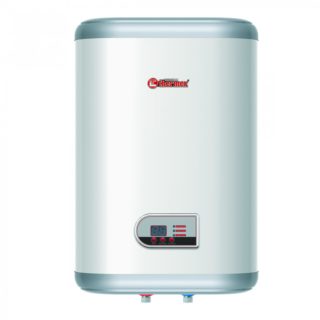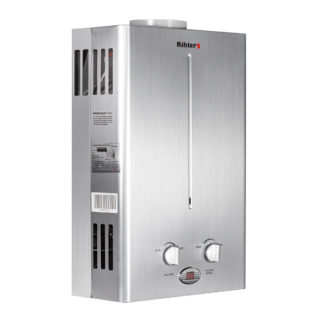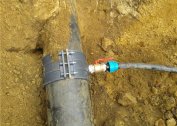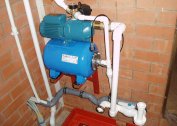According to the method of heating water, hot water systems are divided into closed and open. To better understand what to choose for a private house or apartment, you need to know all the advantages and disadvantages of each method. Sometimes the cost of utility bills depends on this.
Open hot water system
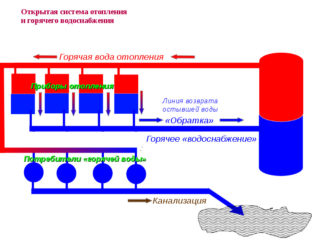 With an open system of hot water supply, the consumer receives ready-made heated water running from the tap. The coolant is located outside the building, so one of the disadvantages of such a system is the inability to control or change the temperature of the liquid. In some regions, they try to save resources, therefore, warm water flows from the tap, which cannot be washed. Even if it heats up, you have to wait with the tap open until the liquid reaches the consumer at the right temperature.
With an open system of hot water supply, the consumer receives ready-made heated water running from the tap. The coolant is located outside the building, so one of the disadvantages of such a system is the inability to control or change the temperature of the liquid. In some regions, they try to save resources, therefore, warm water flows from the tap, which cannot be washed. Even if it heats up, you have to wait with the tap open until the liquid reaches the consumer at the right temperature.
Fee for such water can be low, as state-owned enterprises receive fuel at a reduced price. You can save on the purchase of heating appliances. If the central heating is compliant, you don’t need to buy electric fireplaces or air heaters that circulate warm air in the room.
An open system is gradually losing its relevance, as people tend to make repairs, which include laying a warm floor. The temperature of the centrally supplied fluid may not be enough for heating. In most modern buildings, people are offered a closed hot water system.
Closed DHW system
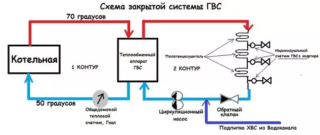 The principle of a closed hot water supply system suggests that the heater takes cold water from a centralized network, heats it and distributes it to points - heating or water for use.
The principle of a closed hot water supply system suggests that the heater takes cold water from a centralized network, heats it and distributes it to points - heating or water for use.
In this case, it is possible to regulate the intensity of the heating element, therefore, to change the temperature of the liquid.
Advantages of a closed system:
- control of fuel - gas, electricity, respectively, it is possible to save money on utility bills;
- if it suddenly gets colder on the street, and the central heating is already turned off, residents with an autonomous water heating system can create comfortable conditions for themselves;
- depending on the cost of fuel, appropriate equipment can be installed to pay less;
- it is possible to choose different types of heating elements - columns, boilers, boilers;
- hot water immediately flows from the tap, so the coolant itself is saved.
In general, the installation of an autonomous system requires more costs - you need to buy a boiler, radiators, pipes, pay for installation work. But subsequently the costs pay off. It is more convenient to configure the equipment according to your needs, not to depend on the city.
Types of heating elements
The following devices are used to heat a cold liquid:
- electric boiler;
- gas column;
- gas or electric boiler;
- coal or wood boiler.
All of them are divided into flowing and storage, differ in design features, power and power source. Boiler refers to flowing. Depending on the flow of water, you can choose the right amount. It takes more time to heat the liquid with an electric heating element, but in general the device is more economical, since it consumes 1 kW per hour. There are gas and electric models. Their minus is that they are designed for a certain amount. If you quickly use it up, you have to wait again until the next batch heats up.
Instantaneous water heaters are much more popular, as they allow you to use hot water in real time, without pre-heating. The most common are gas and electric boilers - single-circuit and double-circuit. Single-circuit only heats tap water for use in the kitchen and in the bathroom. Heating pipes are connected to double-circuit ones. For small rooms there are small models that cope with the task. For a private house or large apartment, an ordinary boiler with an average power is suitable. In them, you can separately conduct pipes for heating the floor and radiators, including, if necessary, all together or one thing.
The advantage is the possibility of tight water circulation. To protect the pipes from the appearance of scale inside, the masters during the start-up of the system pour distilled liquid into it and seal the circuit. If the pressure in the system drops, topping up can be done.
In connection with the rise in price of natural gas, people rework or design new types of boilers that can operate on any type of fuel - firewood, coal, diesel fuel, gasoline, as well as gas and electricity. With an increase in gas prices, you can simply switch to another type of fuel.
Manufacturers offer local appliances for heating water - faucets, powered by the mains. Such a device can be placed in the bathroom or in the kitchen. He does not solve the heating problem, but he is suitable for giving. As soon as the faucet turns on, the liquid begins to heat up, if you turn off the device, the heating automatically stops.
The main differences between hot water systems
First of all, the difference lies in the price of hot water for one and the second type of system. In an open system, consumers pay the total cost of hot water. In this case, the number of people living in the house or apartment is taken into account, the installation of a meter is not required. According to observations, usually people spend less fluid than indicated by the norms for each person.
In a closed system, utility bills are made up of bills for cold water and the cost of the thermal component. In this case, it does not take into account how many people use water. Only the total consumption on the meter matters.
The differences between a closed and an open hot water supply system are mainly associated with comfort and convenience. If with autonomous water supply and heating it is possible to regulate the temperature of the liquid and air in the apartment, then with an open one you have to adapt to the city standards established for all equally.
With a centralized supply of hot water, if there is a breakdown of the heating equipment, only cold water will flow from the tap in the entire area. In the case of installing an autonomous system, heating and hot water disappear at the same time when the electricity is turned off, as boilers, boilers depend on electricity. In a private house, equipment independent of electricity can be built, but then hot liquid will have to be pumped. If the power goes out for a while, the pump will not work.
It is advantageous to use a centralized hot water supply system if the companies responsible for the operation of the equipment fulfill their obligations well. Otherwise, it is better to invest and go to offline.
